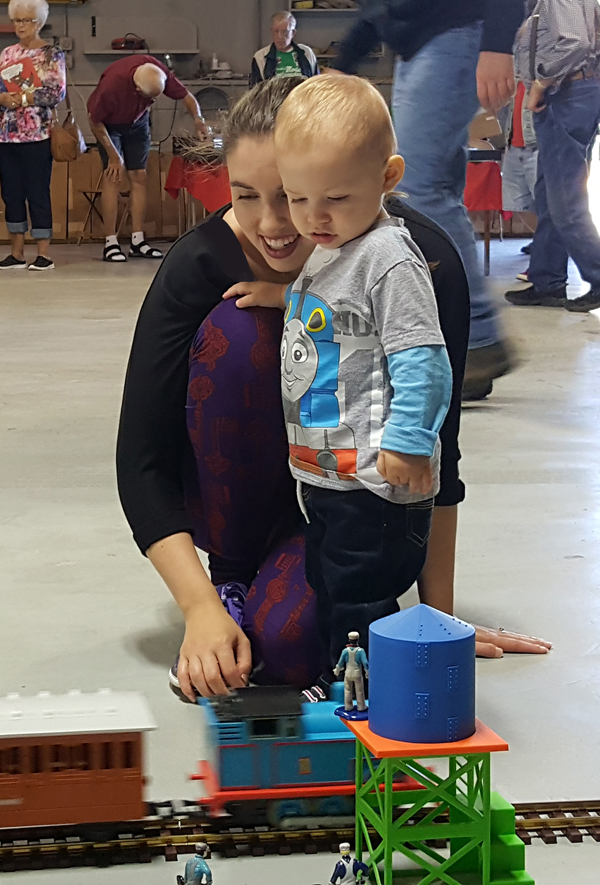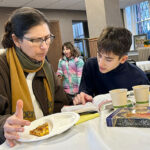By Lindsay Steele
My 16-month-old son, Bradley, loves Thomas the Tank Engine. He dances in front of the television every time the Thomas & Friends theme song begins to play. He loves reading Thomas & Friends books and playing with his toy train set.
I must confess: I like Thomas, too!

Lindsay Steele and her son, Bradley, watch a Thomas the Tank Engine speed by at a model train show in Geneseo, Ill. in September.
Whereas my son is bopping along to the sing-alongs and feeling wowed by the bright colors and constant “go-go” movement of the engines, I am amused by the storylines. Many of them hinge on what I would call “workplace conflicts” or “pride fights” – the kind that happen in a close-knit work environment where people love each other just as much as they get on each other’s nerves. At the end of each episode or movie, the trains generally have a humbling experience that forces them to realize the importance of teamwork and friendship above all else. It’s a cartoon I feel good about watching with my son.
But there’s one aspect of the show that makes me a little sad. The engines want to be liked, but more than that, they want to be really useful. They fear that not being useful enough will get them sent to the scrapyard. “Engines get scrapped when they’re not useful and nobody cares about them anymore,” one engine bemoaned. Even though their controller, Sir Topham Hatt, is a benevolent caretaker, the engines still harbor that fear.
It’s sad to me because it parallels how humans connect worth with usefulness. The worth of people is too often determined by the extent of his or her abilities. Every day, we see people get “scrapped” by the idea that they can’t be really useful. Unborn children are aborted at alarmingly high rates for testing positive for genetic disorders. In places where assisted suicide is legal, perceived usefulness (or lack thereof) can become a factor in someone’s decision to live or die.
In the Thomas & Friends world, this fear of being “scrapped” is most evident to me in the feature-length film “Hero of the Rails.” In the movie, a large, rusty engine named Hiro hides in the woods for years out of fear for his demise. Originally from Japan, he believes he has been sent to the fictional island of Sodor — Thomas’ home — to be scrapped. Thomas discovers the engine by accident, and Thomas and his engine friends work together to repair Hiro in secret so they can show Sir Topham Hatt that Hiro is a “really useful engine” that does not warrant a scrapping.
Sir Topham Hatt tells the engines at the end of the movie that he never intended to scrap Hiro and was happy only because they had found him. Sir Topham Hatt explains that he brought Hiro to the island to save him from being scrapped elsewhere; he felt that Hiro’s “life” was still worth living, and he could still be “master of the railway” with proper care and encouragement. It’s something Sir Topham Hatt does a lot in the series — he adopts unwanted engines from other places and finds ways to utilize their gifts. In Hiro’s case, these gifts are wisdom, kindness and strength.
God teaches us that personhood is what makes a human valuable. Everyone has a purpose simply because he or she is made in the image of God. Everyone has gifts to share, despite perceived limitations. In God’s eyes, no gift is considered more useful or valuable than another gift — just different.
As Catholics, we should try our best to express and to live out this truth. This could mean standing up for the most vulnerable in our society. It could mean reassuring someone who is feeling depressed that they have a purpose and that life is worth living. It could mean giving people with disabilities a place in our workforce. It could be addressing our own prejudices.
After all, everyone has an important role on God’s “railway.”











